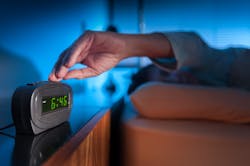Many Americans will lose an hour of sleep on Sunday, the first day of daylight saving time, when clocks are set ahead one hour at 2 a.m. local standard time – making it harder to wake up, causing difficulty in staying alert and increasing the chance of car crashes.
Ronald D. Chervin, M.D., says Americans can prepare for the daylight saving time switch. Chervin says it can be as simple as going to sleep and waking up earlier by 15-minute intervals in the days leading up to Sunday’s change.
“Being prepared is important, especially if you need to be alert that day for any reason, particularly driving a car," said Chervin, a professor of neurology at the University of Michigan and director of U-M’s Sleep Disorders Center. "Even one hour of sleep loss can affect some people,”
In the days immediately following the spring switch each year, more people have serious crashes, probably because of the sleep loss and adjustments that everyone’s biological clock must make to the new schedule. The first day of daylight saving time is not the only time when the amount of sleep should be of concern, however. Chervin says most adults should get about 8 to 8.5 hours of sleep a night, but many get less and are chronically sleep deprived. Those patterns can start in childhood.
“We generally spend one-third of life sleeping – or at least we should,” Chervin said. “We’re learning more and more about how that one-third has critical impact on the other two-thirds.”
It’s hard to find any aspect of health untouched by sleep, Chervin said. The brain of a person who does not get enough sleep – in quality and in quantity – is unable to operate efficiently. Health, emotions, memory and more are affected. Furthermore, sleep disorders also may increase risks of obesity, diabetes, stroke and heart attacks.
The National Sleep Foundation offers the following healthy sleep tips:
- Go to sleep and wake up at the same time every day, and avoid spending more time in bed than needed.
- Use your bedroom only for sleep to strengthen the association between your bed and sleep. It may help to remove work materials, computers and televisions from your bedroom.
- Create an environment conducive to sleep that is quiet, dark and cool with a comfortable mattress and pillows.
- Reduce or eliminate your intake of caffeine, nicotine and alcohol.
About the Author

Laura Walter
Laura Walter was formerly senior editor of EHS Today. She is a subject matter expert in EHS compliance and government issues and has covered a variety of topics relating to occupational safety and health. Her writing has earned awards from the American Society of Business Publication Editors (ASBPE), the Trade Association Business Publications International (TABPI) and APEX Awards for Publication Excellence. Her debut novel, Body of Stars (Dutton) was published in 2021.
